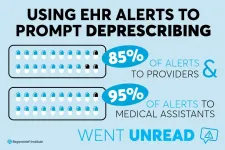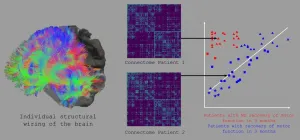(Press-News.org) INDIANAPOLIS -- The vast majority of electronic health record (EHR) alerts attempting to reduce the prescribing of high-risk medications linked to dementia in older adults went unread in a study led by research scientists from Regenstrief Institute, Purdue University and Indiana University School of Medicine. The goal of the intervention was to facilitate the deprescribing of anticholinergics through both provider and patient-based alerts, however, engagement with the alerts was so low, the study team was unable to conclude if this approach could be an effective method.
Anticholinergics are drugs which affect the brain by blocking acetylcholine, a nervous system neurotransmitter that influences memory, alertness and planning skills. They are linked to dementia and prescribed for many conditions common in older adults including depression, urinary incontinence, irritable bowel syndrome and Parkinson's disease. These medications are used by approximately one in four older adults each year, and nearly half of older adults have used this type of medication at least once in a five-year period.
Many medical groups have come out in support of deprescribing anticholinergics, but it is challenging to execute in an already busy primary care environment.
"Deprescribing is very complex and rarely prioritized over common medical problems during visits with primary care providers," said study lead author Noll Campbell, PharmD, M.S., research scientist at the IU Center for Aging Research at Regenstrief and assistant professor of pharmacy at Purdue University College of Pharmacy. "In this study, we used principles of behavioral economics in the design of EHR nudges directed at both providers and patients to promote the deprescribing of high-risk anticholinergic medications. However, very few of the alerts were viewed by either recipient, so we are now evaluating how we can change or improve this approach."
In this study, an alert let the provider know that the patient had high-risk anticholinergic medications prescribed in the medical record and offered alternatives to those medications. Alerts also prompted staff to play a video providing education about the medicines and modeling a discussion that led to a change in prescription for patients who were prescribed one of the target medications.
The research team conducted the cluster randomized trial in Eskenazi Health clinics and compared the medication records to the previous year to see if there were any changes. They found there were no significant differences in deprescribing between the control group and the intervention group.
During the course of the study, 85 percent of alerts to providers and 95 percent of alerts to medical assistants went unread, so study authors cannot conclude that priming patients and providers for the discussion is not a feasible strategy, only that the methods used in this study were not successful in reaching the target recipients.
"One option going forward is to experiment with different design approaches in EMR-based nudges," said Dr. Campbell. "Alternatively, a shift towards human-based interventions that can manage the complexity of deprescribing activities may be more effective at deprescribing high-risk anticholinergic medications. While we pursue the goal of understanding clinical implications, we are also cognizant of the scalability of interventions if there is clinical benefit realized by reducing these high-risk medications."
Dr. Campbell and his colleagues at Regenstrief are currently conducting a clinical trial designed to determine if stopping anticholinergic medications results in sustained improvements in cognition. This trial involves clinical pharmacists working with physicians and patients to switch to safer medicines.
Another study at the IU Center for Aging Research at Regenstrief is testing an app called BrainSafe, which provides information on anticholinergics to patients with the goal of leading them to initiate a deprescribing conversation.
INFORMATION:
"Multicomponent behavioral intervention to reduce exposure to anticholinergics in primary care older adults" is published in the June print issue of the Journal of the American Geriatrics Society. This study was supported by a grant from the Agency for Healthcare Research and Quality (AHRQ) (P30HS24384).
In addition to Dr. Campbell, authors on the paper are Richard Holden, PhD of Regenstrief, the Sandra Eskenazi Center for Brain Care Innovation, IU School of Medicine and the Center for Health Innovation and Implementation Science; Qing Tang, M.S. of IU School of Medicine; Malaz Boustani, M.D., MPH of Regenstrief, the Sandra Eskenazi Center for Brain Care Innovation, IU School of Medicine and the Center for Health Innovation and Implementation Science; Evgenia Teal, M.A. of Regenstrief; Jennifer Hillstrom, B.S. of the Sandra Eskenazi Center for Brain Care Innovation; Wanzhu Tu, PhD of Regenstrief Institute and IU School of Medicine; Daniel O. Clark, PhD of Regenstrief, the Sandra Eskenazi Center for Brain Care Innovation and IU School of Medicine and Christopher M. Callahan, M.D. of Regenstrief, the Sandra Eskenazi Center for Brain Care Innovation and IU School of Medicine.
About Regenstrief Institute
Founded in 1969 in Indianapolis, the Regenstrief Institute is a local, national and global leader dedicated to a world where better information empowers people to end disease and realize true health. A key research partner to Indiana University, Regenstrief and its research scientists are responsible for a growing number of major healthcare innovations and studies. Examples range from the development of global health information technology standards that enable the use and interoperability of electronic health records to improving patient-physician communications, to creating models of care that inform practice and improve the lives of patients around the globe.
Sam Regenstrief, a nationally successful entrepreneur from Connersville, Indiana, founded the institute with the goal of making healthcare more efficient and accessible for everyone. His vision continues to guide the institute's research mission.
About Purdue University College of Pharmacy
The mission of the Purdue University College of Pharmacy is to advance scientific discovery and development, maximize global health outcomes through patient care and public service, and educate and train students to become leading pharmacists and scientists. The goal is to transform the practice and science of pharmacy to lead advances in human health.
About IU School of Medicine
IU School of Medicine is the largest medical school in the U.S. and is annually ranked among the top medical schools in the nation by U.S. News & World Report. The school offers high-quality medical education, access to leading medical research and rich campus life in nine Indiana cities, including rural and urban locations consistently recognized for livability.
About Noll Campbell, PharmD, M.S.
In addition to his role as a research scientist at Regenstrief Institute, Noll Campbell, PharmD, M.S., is an assistant professor of pharmacy practice at the Purdue University College of Pharmacy.
When blood flow to the brain is somehow reduced or restricted, a person can suffer what we know as a stroke (from "ischemic stroke" in medical jargon). Stroke is one of those conditions that seems fairly common. This isn't a misperception: just in Europe, there are over 1.5 million new cases each year.
Some strokes can be lethal, and when they're not they often result in serious damage to the victim's ability to move. In fact, stroke is one of the major causes of long-term disability today. Recovery can be a long and arduous road. Again, in Europe, under 15% of the patients ...
Software to help towns and cities use street-planting to reduce citizens' exposure to air pollution has been developed by researchers at the University of Birmingham.
Street planting, or 'green infrastructure', is an essential part of the urban realm, but there is a misconception that plants remove or 'soak up' a lot of pollution. Instead, planting at this scale primarily serves to redistribute pollution by changing air currents within streets and beside open roads.
Because of this, not only the position and amount of planting within a street, but also ...
Astronomers have designed and trained a computer program which can classify tens of thousands of galaxies in just a few seconds, a task that usually takes months to accomplish.
In research published today, astrophysicists from Australia have used machine learning to speed up a process that is often done manually by astronomers and citizen scientists around the world.
"Galaxies come in different shapes and sizes" said lead author Mitchell Cavanagh, a PhD candidate based at The University of Western Australia node of the International Centre for Radio Astronomy Research (ICRAR).
"Classifying the shapes of galaxies is an important step in understanding their formation and evolution, and can even shed light on the nature of the Universe itself."
Mr Cavanagh said that ...
Most common bone and joint (orthopaedic) procedures, such hip replacements and shoulder repair surgery, are not backed up by high quality evidence, mainly because of a lack of definitive trials, suggests an analysis of data published by The BMJ today.
Yet despite the lack of strong supporting evidence, some of these procedures are still recommended by national guidelines in certain situations, the findings show.
Musculoskeletal conditions affect around 1 in 4 UK adults and account for over 25% of all NHS surgical interventions at a cost of £4.76 billion each year.
National ...
Muscle relaxant drugs are largely ineffective for low back pain, despite being widely prescribed for this condition, suggests an analysis of the latest evidence published by The BMJ today.
The findings show that muscle relaxants might reduce pain in the short term, but the effect is too small to be considered clinically meaningful, and there is an increased risk of side effects.
But the researchers stress that the certainty of evidence is low and say large trials are urgently needed to resolve uncertainties around the use of these drugs for back pain.
Low back pain is a global public health problem and muscle relaxants (a broad class of drugs that include ...
Mandatory covid-19 vaccination for care home workers is unnecessary, disproportionate and misguided, warn experts
And is based on unreliable data
In The BMJ today, experts argue that mandatory vaccination is "unnecessary, disproportionate, and misguided."
The government decision to remove the right of care home staff in England to choose whether or not to be vaccinated against covid-19 is a profound departure from public health norms. The intended next step is a rapid and massive expansion of compulsory vaccination to legally require covid-19 and flu vaccination of all frontline health and social care workers, subject to consultation.
But Lydia Hayes, Professor of Law at Kent ...
An estimated 8.4 billion people could be at risk from malaria and dengue by the end of the century if emissions keep rising at current levels, according to a new study published in The Lancet Planetary Health.
The research team estimates that this worst-case scenario would mean the population at risk of the diseases might increase by up to 4.7 additional billion people (relative to the period 1970-1999), particularly in lowlands and urban areas, if temperatures rise by about 3.7°C 1 by 2100 compared to pre-industrial levels.
The study was led by the London School of Hygiene & Tropical Medicine (LSHTM) with partners from Umeå University, Sweden; Abdus Salam ...
LOS ANGELES - A new prognostic tool developed by researchers from the UCLA Jonsson Comprehensive Cancer Center and five other institutions helps predict which men with advanced metastatic prostate cancer will respond favorably to a novel targeted therapy.
The tool, described in a study published today in Lancet Oncology, analyzes a wide spectrum of imaging and clinical data and is intended to assist physicians considering treating patients with Lutetium-177 prostate-specific membrane antigen, or LuPSMA.
LuPSMA, which binds to PSMA proteins and delivers targeted radiation to prostate cancer tissue, offers a new option to men with PSMA-positive metastatic cancer that is castration-resistant, meaning it has stopped ...
The protein actin is ubiquitous and essential for life. In mammals, every cell expresses two of its forms, beta-actin and gamma-nonmuscle-actin. Despite having distinct roles, the two forms are nearly identical, sharing 99% of their amino acid sequence.
Research by Anna Kashina of Penn's School of Veterinary Medicine and colleagues has shown that, contrary to scientific dogma, it's not the slight differences in amino acid sequence that govern these proteins' discrete functions in the cell. Rather, their nucleotide sequences--the "letters" that make up their DNA coding sequence, which differ by roughly 13% between the two forms--are responsible for their individual roles in organisms' ...
Researchers have produced vaccine-like immune responses to a dangerous bacterium by colonizing 26 healthy volunteers with a related, but harmless, commensal bacterial species. The first-in-human, controlled infection study showed the strategy was safe, as no side effects were reported and the volunteers didn't transmit the commensal bacteria to bedroom-sharers over the 90-day study. Neisseria lactamica is a member of the microbiome that usually resides in the upper airways of children but can also safely colonize the airways of adults. Some researchers theorize that these bacteria ...



